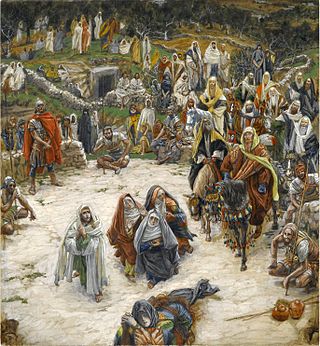
The sayings of Jesus on the cross are seven expressions biblically attributed to Jesus during his crucifixion. Traditionally, the brief sayings have been called "words".

Two names and a variety of titles are used to refer to Jesus in the New Testament. In Christianity, the two names Jesus and Emmanuel that refer to Jesus in the New Testament have salvific attributes. After the crucifixion of Jesus the early Church did not simply repeat his messages, but focused on him, proclaimed him, and tried to understand and explain his message. One element of the process of understanding and proclaiming Jesus was the attribution of titles to him. Some of the titles that were gradually used in the early Church and then appeared in the New Testament were adopted from the Jewish context of the age, while others were selected to refer to, and underscore the message, mission and teachings of Jesus. In time, some of these titles gathered significant Christological significance.

The tittle or superscript dot is the dot on top of lowercase i and j. The tittle is an integral part of these glyphs, but diacritic dots can appear over other letters in various languages. In most languages, the tittle of i or j is omitted when a diacritic is placed in the tittle's usual position, but not when the diacritic appears elsewhere.
Yodh is the tenth letter of the Semitic abjads, including Phoenician yōd 𐤉, Hebrew yudי, Aramaic yod 𐡉, Syriac yōḏ ܝ, and Arabic yāʾي. Its sound value is in all languages for which it is used; in many languages, it also serves as a long vowel, representing.
There exists a consensus among scholars that the language of Jesus and his disciples was Aramaic. Aramaic was the common language of Judea in the first century AD. The villages of Nazareth and Capernaum in Galilee, where Jesus spent most of his time, were Aramaic-speaking communities. Jesus probably spoke a Galilean variant of the language, distinguishable from that of Jerusalem. Based on the symbolic renaming or nicknaming of some of his apostles it is also likely that Jesus or at least one of his apostles knew enough Koine Greek to converse with those not native to Judea. It is reasonable to assume that Jesus was well versed in Hebrew for religious purposes.
The Gospel of the Nazarenes is the traditional but hypothetical name given by some scholars to distinguish some of the references to, or citations of, non-canonical Jewish-Christian Gospels extant in patristic writings from other citations believed to derive from different Gospels.
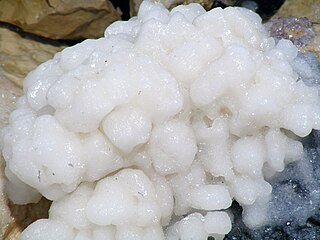
Matthew 5:13 is the thirteenth verse of the fifth chapter of the Gospel of Matthew in the New Testament. It is part of the Sermon on the Mount, the first of a series of metaphors immediately following the Beatitudes.
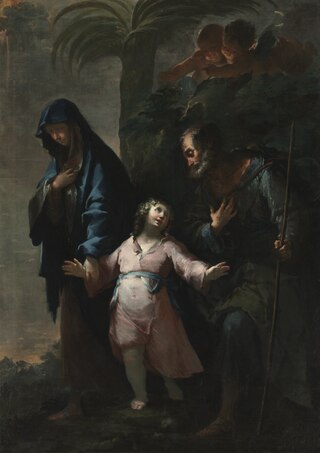
Matthew 2:23 is the twenty-third verse of the second chapter of the Gospel of Matthew in the New Testament. The young Jesus and the Holy Family have just returned from Egypt and in this verse are said to settle in Nazareth. This is the final verse of Matthew's infancy narrative.

Matthew 6:11 is the eleventh verse of the sixth chapter of the Gospel of Matthew in the New Testament and forms part of the Sermon on the Mount. This verse is the third one of the Lord's Prayer, one of the best known parts of the entire New Testament. This brief verse contains the fourth petition to God.

Matthew 5:5 is the fifth verse of the fifth chapter of the Gospel of Matthew in the New Testament. It is the third verse of the Sermon on the Mount, and also the third of what are known as the Beatitudes.

Matthew 5 is the fifth chapter of the Gospel of Matthew in the New Testament. It contains the first portion of the Sermon on the Mount, the other portions of which are contained in chapters 6 and 7. Portions are similar to the Sermon on the Plain in Luke 6, but much of the material is found only in Matthew. It is one of the most discussed and analyzed chapters of the New Testament. Warren Kissinger reports that among early Christians, no chapter was more often cited by early scholars. The same is true in modern scholarship.

Matthew 5:12 is the twelfth verse of the fifth chapter of the Gospel of Matthew in the New Testament. It is the tenth verse of the Sermon on the Mount. This verse is generally seen as part of an expansion of the eight Beatitude, others see it as the second half of the ninth Beatitude, a small group feel it is the tenth Beatitude and thus brings to a close a second Decalogue.

Matthew 5:19 is the nineteenth verse of the fifth chapter of the Gospel of Matthew in the New Testament and is part of the Sermon on the Mount. Jesus has reported that he came not to destroy the law, but fulfil it. In this verse he perhaps continues to reinforce this claim.

Matthew 5:21 is the twenty-first verse of the fifth chapter of the Gospel of Matthew in the New Testament and is part of the Sermon on the Mount. It opens the first of what have traditionally been known as the Antitheses in which Jesus compares the current interpretation of a part of Mosaic Law with how it should actually be understood. This verse begins the discussion of murder.

Matthew 5:22 is the twenty-second verse of the fifth chapter of the Gospel of Matthew in the New Testament and is part of the Sermon on the Mount. It is the first of what have traditionally been known as the 6 Antitheses. In this one, Jesus compares the current interpretation of "You shall not murder" from the Ten Commandments with his own interpretation.

Matthew 5:26 is the twenty-sixth verse of the fifth chapter of the Gospel of Matthew in the New Testament and is part of the Sermon on the Mount. Jesus has just warned that if you do not reconcile with your enemies a judge is likely to throw you in jail. In this verse Jesus mentions that your debts must be paid completely before one can leave.
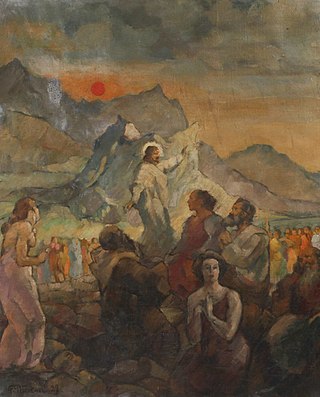
Matthew 5:35 and Matthew 5:36 are the thirty-fifth and thirty-sixth verses of the fifth chapter of the Gospel of Matthew in the New Testament. They are part of the Sermon on the Mount. These verses are part of either the third or fourth antithesis, the discussion of oaths. Jesus tells his listeners in Matthew 5:34 "to not swear oaths" and in here presents examples of swearing oaths. In context, this passage refers not to the modern understanding of cursing or using foul language, but rather, the act of swearing oaths and making promises.

Matthew 6:1 is the first verse of the sixth chapter of the Gospel of Matthew in the New Testament and is part of the Sermon on the Mount. This verse begins the discussion of how even good deeds can be done for the wrong reasons.
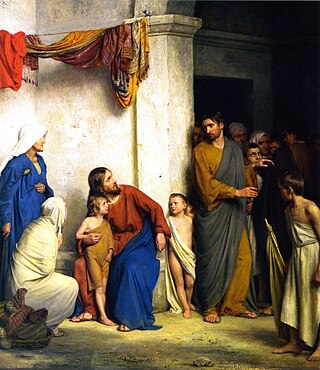
Chapter 18 of the Gospel of Matthew contains the fourth of the five Discourses of Matthew, also called the Discourse on the Church or the ecclesiastical discourse. It compares "the greatest in the Kingdom of Heaven" to a child, and also includes the parables of the lost sheep and the unforgiving servant, the second of which also refers to the Kingdom of Heaven. The general themes of the discourse are the anticipation of a future community of followers, and the role and "spiritual condition" of his apostles in leading it.
"My God, my God, why hast Thou forsaken me?" is a phrase that appears both in the Old Testament or Hebrew Bible, in the Book of Psalms, as well as in the New Testament of the Christian Bible, as one of the sayings of Jesus on the cross, according to Matthew 27:46 and also Mark 15:34.
















